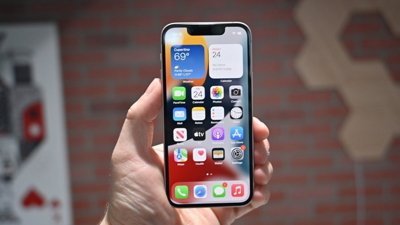Apple's App Tracking Transparency driving advertisers to spend more on Android
Advertisers are reacting to the introduction of Apple's App Tracking transparency by changing their spending strategy, with an increasing shift to ad spends on Android.
App Tracking Transparency is intended as a way to allow users to maintain their online privacy, but was thought to be an issue for marketers in limiting how they can target users with advertising. A few months after its introduction, it appears that advertisers are changing how they spend their marketing funds.
According to figures from ad analytics firm Tenjin seen by the Wall Street Journal, spending on iOS ad platforms dropped by approximately a third between the first of June and the first of July. Meanwhile, advertising on Android platforms increased by approximately 10% at the same time.
In the case of ad agency Tinuiti, advertisers couldn't bid for targeted advertising on iOS users after ATT's implementation. The change sparked a rise in demand for targeted advertising on Android devices, moving from 46% year-on-year growth in May to 64% in June.
Tinuiti research director Andy Taylor said that iOS spending dropped from 42% growth in May to 25% in June, with iOS seeing a contraction of year-on-year growth over the same comparable timeframe. While both Android and iOS were still seeing growth, the rate dropped for iOS since ATT's introduction, while Android's has risen.
Android ad prices are now roughly 30% higher than ads aimed at iOS users, Taylor added.
The report is similar to one from May 19, which also claimed advertisers were moving their spending over to Android. At the time, Android advertising spending was up by between 8.3% and 21%, depending on the firm, while iOS saw a marginal decline of around 3% in general.
It is believed that the lack of targeting caused by the introduction of ATT is behind the change, with less granular data provided to advertisers about consumers they wish to target. According to Branch Metrics, less than a third of iOS users opt in to tracking, severely limiting the number of user devices that can be tracked by apps.
A spokesperson for Facebook, a major critic of ATT, said "Third-party data tends to be unreliable and not representative of our business," namely that it's harder to advertise using alternate data sources than by directly tracking users.
However, Facebook isn't fazed by the ad problem. "While we expect iOS 14.5 to be a headwind for the remainder of the year, the impact on our business will be manageable."
According to people familiar with Facebook's operations, most users in foreign countries use Android, which means the social network could be benefiting from the higher pricing of non-iOS platforms.
Keep up with everything Apple in the weekly AppleInsider Podcast — and get a fast news update from AppleInsider Daily. Just say, "Hey, Siri," to your HomePod mini and ask for these podcasts, and our latest HomeKit Insider episode too. If you want an ad-free main AppleInsider Podcast experience, you can support the AppleInsider podcast by subscribing for $5 per month through Apple's Podcasts app, or via Patreon if you prefer any other podcast player.
 Malcolm Owen
Malcolm Owen











 William Gallagher
William Gallagher


 Christine McKee
Christine McKee

 Amber Neely
Amber Neely









